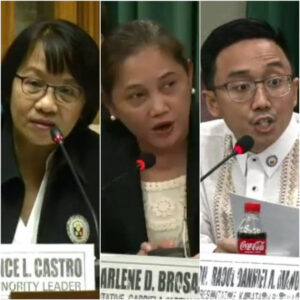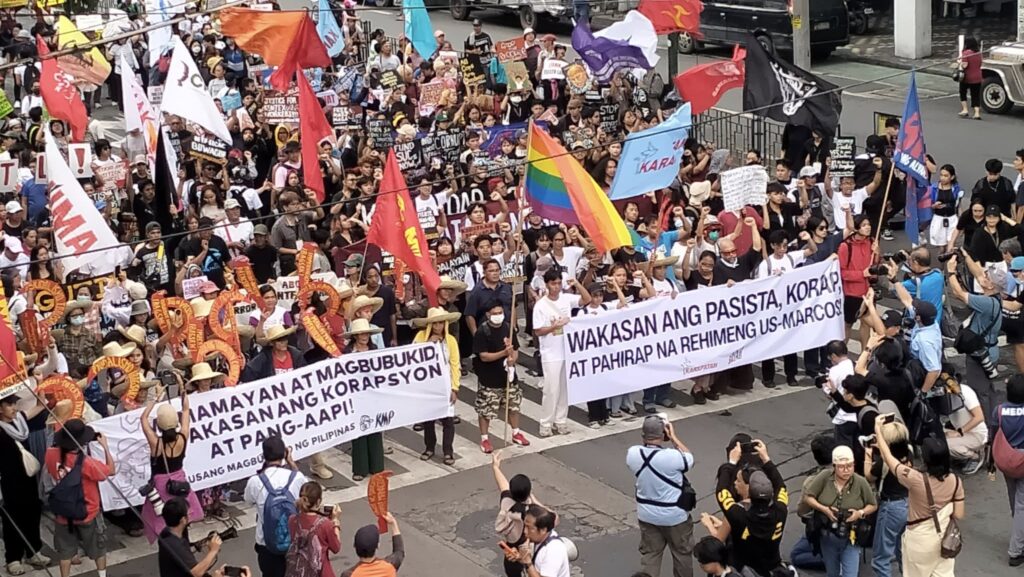📷ACT Teachers Rep. France Castro ,GWP Rep. Arlene Brosas and Kabataan Rep. Raoul Manuel
We, the Makabayan Bloc in Congress, strongly denounce the recently approved bicameral conference committee report on the 2025 national budget as a blatant replay of fiscal mismanagement and political patronage. The approved budget not only slashes critical funding for social services but also bloats discretionary funds and pork barrel allotments, prioritizing the ambitions of the political elite over the needs of ordinary Filipinos.
The bicameral committee’s deliberation despite being televised, was riddled with opacity. The public was kept in the dark about the specific amendments, their justifications, and their impacts on urgent social services. Once again, the bicam has proven itself to be an unaccountable “third chamber” of Congress, questionably wielding power to sabotage the priorities of the people.
The cuts to essential services are unconscionable. PhilHealth’s subsidy was slashed by ₱74.43 billion, while the Department of Health and the Department of Education were likewise subjected to budget cuts. Meanwhile, the Department of Public Works and Highways (DPWH) received an additional ₱289 billion for infrastructure projects that are rife with pork barrel allocations and opportunities for kickbacks.
“Bakit ang pera para sa kalusugan, edukasyon, at iba pang pangangailangan ng taumbayan ang laging tinatanggalan? Pero ang pork barrel para sa DPWH, confidential and intelligence funds, at iba pang discretionary funds ng administrasyon ay hindi lang pinananatili, kundi dinaragdagan pa,” said ACT Teachers Rep. France Castro. “This is the height of misprioritization and callousness!”
The bicameral report also retains the questionable AKAP program. Together with funds other politicized social safety net funds, this is a thinly veiled attempt to legalize “ayuda politics” for the 2025 elections, routing public funds through politicians to enable massive vote-buying disguised as financial assistance. Such a move not only undermines the integrity of elections but also turns the General Appropriations Act into a tool for electioneering.
“Ang pondo ng bayan ay dapat nakalaan para sa taumbayan, hindi sa pangangampanya ng mga nasa poder!” said Kabataan Rep. Raoul Manuel. “This budget is an insult to the Filipino people who are struggling with skyrocketing prices, low wages, and deteriorating public services.”
Despite widespread calls for accountability, President Bongbong Marcos’ ₱4.5 billion in confidential and intelligence funds (CIFs) was left untouched. Worse, the bicam even increased the Office of the President’s budget by an additional ₱5.4 billion without any transparent justification.
“This budget reeks of misplaced priorities. Instead of ensuring funding for education, health, and livelihood, the bicam chose to protect the vested interests of the President and his allies,” said Gabriela Women’s Party Rep. Arlene Brosas. “Ang pera ng bayan ay para sa bayan, hindi para sa bulsa ng iilan!”
We call on the leadership of both the House and Senate to address the growing public outrage by immediately reconvening the bicameral conference committee. The bicam must restore the slashed budgets for social services and remove all pork barrel allotments in infrastructure projects, as well as the 17.3 billion increase in the budget of the House of Representatives itself. This should be done under full public transparency, with proceedings broadcast live for the Filipino people to witness.
We note that reconvening a bicameral conference committee to address shortcomings in its report is not unprecedented. The bicam for the Magna Carta for Seafarers was reconvened three times, even after ratification, in order to address certain alleged flaws before it was signed into law by the President.
Finally, we reaffirm our stand that a genuine people’s budget must prioritize the welfare of the Filipino masses—health care, education, housing, and decent jobs—not the pockets of the powerful few. It should serve to promote genuine agrarian reform, national industrialization, and an independent foreign policy. ###




